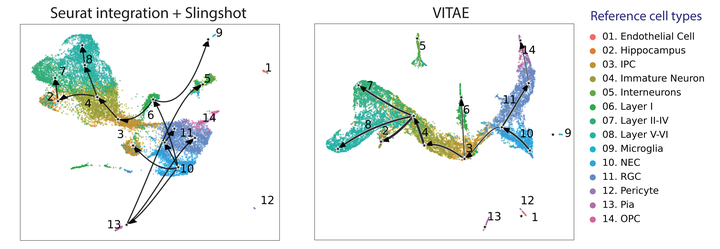Joint Trajectory Inference for Single-cell Genomics Using Deep Learning with a Mixture Prior
 VITAE provides better trajectory inference than an alternative Seurat integration + Slingshot approach
VITAE provides better trajectory inference than an alternative Seurat integration + Slingshot approachAbstract
Trajectory inference methods are essential for analyzing the developmental paths of cells in single-cell sequencing datasets. It provides insights into cellular differentiation, transitions, and lineage hierarchies, helping unravel the dynamic processes underlying development and disease progression. However, many existing tools lack a coherent statistical model and reliable uncertainty quantification, limiting their utility and robustness. In this paper, we introduce VITAE (Variational Inference for Trajectory by AutoEncoder), a statistical approach that integrates a latent hierarchical mixture model with variational autoencoders to infer trajectories. The statistical hierarchical model enhances the interpretability of our framework, while the posterior approximations generated by our variational autoencoder ensure computational efficiency and provide uncertainty quantification of cell projections along trajectories. Specifically, VITAE enables simultaneous trajectory inference and data integration, improving the accuracy of learning a joint trajectory structure in the presence of biological and technical heterogeneity across datasets. We show that VITAE outperforms other state-of-the-art trajectory inference methods on both real and synthetic data under various trajectory topologies. Furthermore, we apply VITAE to jointly analyze three distinct single-cell RNA sequencing datasets of the mouse neocortex, unveiling comprehensive developmental lineages of projection neurons. VITAE effectively reduces batch effects within and across datasets and uncovers finer structures that might be overlooked in individual datasets. Additionally, we showcase VITAE’s efficacy in integrative analyses of multiomic datasets with continuous cell population structures.